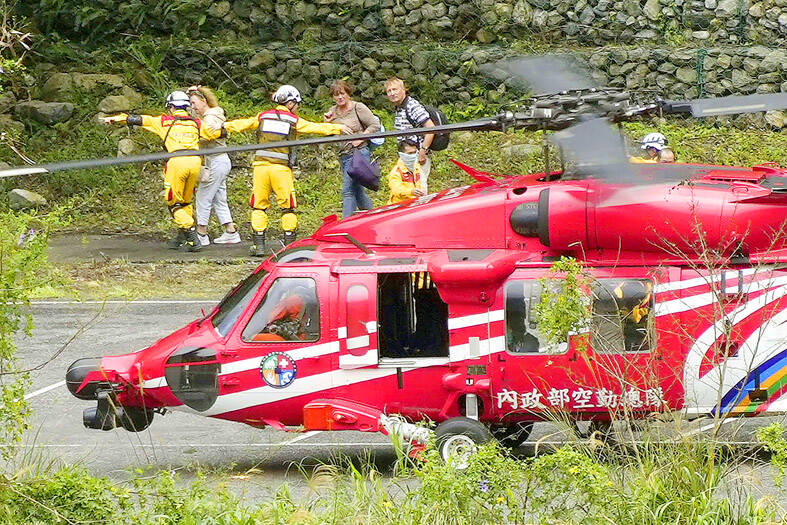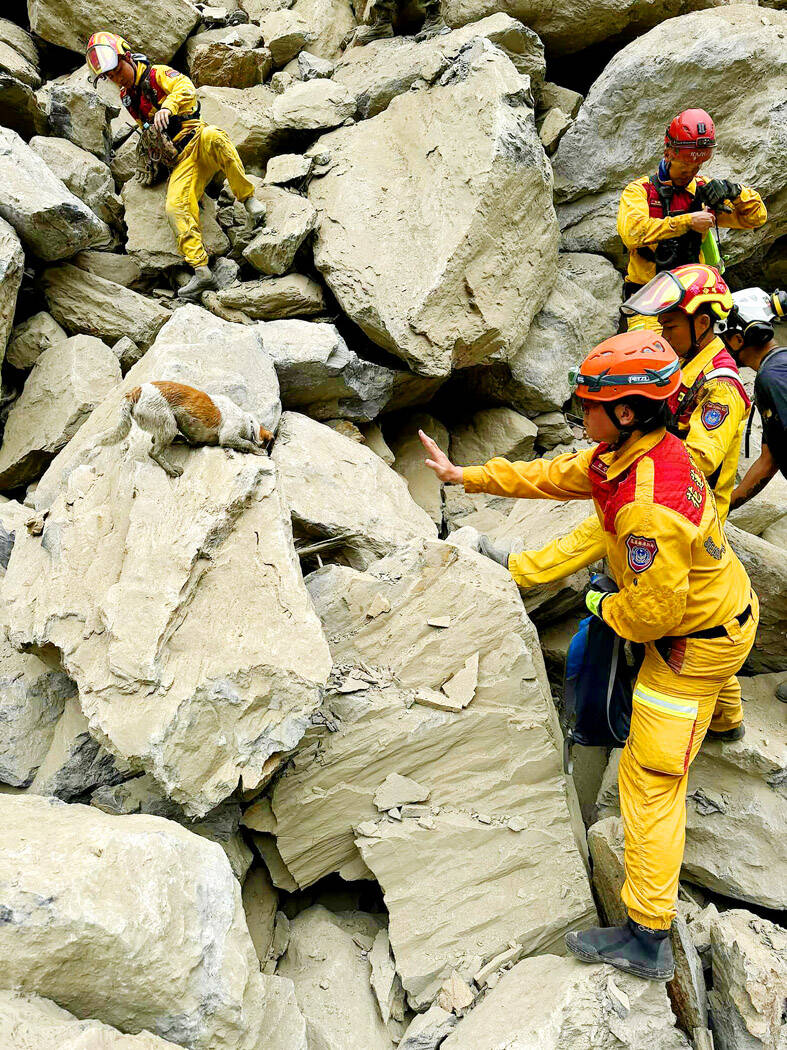The number of people confirmed dead after Wednesday’s massive earthquake has risen to 13 following the discovery of a woman in Hualien County yesterday and the confirmation of two bodies found on Friday, the Central Emergency Operations Center said, as rescuers continued to airlift trapped people in Hualien County.
The three deceased were among six people reported missing on Taroko National Park’s Shakadang Trail (砂卡礑).
The body of a 21-year-old woman surnamed Hu (胡), who traveled to Hualien alone, was found at the 0.5km mark on the trail at about 11am yesterday. An identification card was found on her body.

Photo: Suo Takekuma, Kyodo News via AP
It was earlier believed that the body could be that of another woman, who, along with her husband, surnamed Yu (游), and three children, were on the trail at the time of the quake.
Rescue personnel found the two other bodies on the trail on Friday, but they were not included in the official death toll until yesterday.
Yu’s mother said they were her son and 11-year-old granddaughter, but they have not been formally identified.

Photo courtesy of the Hualien Fire Department
Yu’s wife, eight-year-old son and five-year-old daughter could be buried more than 25m below the trail, rescue personnel said, adding that aftershocks and inclement weather have affected the rescue mission.
As of 2:30pm yesterday, 13 people had died and 1,145 were injured in the earthquake, while 405 were trapped or stranded and six were missing, data released by the center showed.
As of 10am — 74 hours after the temblor, which measured 7.2 on the Richter scale and magnitude 7.4 on the moment magnitude scale — the Central Weather Administration had recorded 603 aftershocks, including 23 that were magnitude 5 or greater.
The aftershocks have loosened earth, causing rocks to continue falling intermittently.
Demolition of a building in Hualien City that was leaning precariously after the quake was also halted, because of aftershocks that caused it to lean further.
Meanwhile, National Airborne Service Corps helicopters flew to areas that had been cut off near Taroko National Park to airlift stranded people.
“Priority was given to the elderly, the weak, women, children and people with chronic diseases,” news Web site ET Today reported. “Although everyone was tired after coming down the mountain, they were all still smiling.”
One airlift brought people from the luxury Silks Place Taroko (太魯閣晶英酒店) hotel, where more than 400 tourists and staff had been stranded.
Rescuers also airdropped boxes of food and supplies to a group of students, teachers and residents at an inaccessible elementary school.
Elsewhere, engineers were working around the clock to clear massive boulders from roads and tunnel entrances.
Minister of the Interior Lin Yu-chang (林右昌) said that Taiwan would bolster its rescue operations by working with a team of experts from Turkey.
Seven Turkish rescuers arrived in Taiwan last night and brought with them drone technology to assist in the rescue efforts due to the challenging terrain in the area, said Lin, who also heads the Central Emergency Operation Center.
Other than the drones, local rescue capabilities and resources are plentiful, he said, adding that the Turkish team is the only foreign rescue team Taiwan has accepted technical assistance from.

Intelligence agents have recorded 510,000 instances of “controversial information” being spread online by the Chinese Communist Party (CCP) so far this year, the National Security Bureau (NSB) said in a report yesterday, as it warned of artificial intelligence (AI) being employed to generate destabilizing misinformation. The bureau submitted a written report to the Legislative Yuan in preparation for National Security Bureau Director-General Tsai Ming-yen’s (蔡明彥) appearance before the Foreign Affairs and National Defense Committee today. The CCP has been using cognitive warfare to divide Taiwanese society by commenting on controversial issues such as Taiwan Semiconductor Manufacturing Co’s (TSMC, 台積電) investments in the

HELPING HAND: The steering committee of the National Stabilization Fund is expected to hold a meeting to discuss how and when to utilize the fund to help buffer the sell-off The TAIEX plunged 2,065.87 points, or 9.7 percent, to close at 19,232.35 yesterday, the highest single-day percentage loss on record, as investors braced for US President Donald Trump’s tariffs after an extended holiday weekend. Amid the pessimistic atmosphere, 945 listed companies led by large-cap stocks — including Taiwan Semiconductor Manufacturing Co (TSMC, 台積電), Hon Hai Precision Industry Co (鴻海精密) and Largan Precision Co (大立光) — fell by the daily maximum of 10 percent at the close, Taiwan Stock Exchange data showed. The number of listed companies ending limit-down set a new record, the exchange said. The TAIEX plunged by daily maxiumu in just

‘COMPREHENSIVE PLAN’: Lin Chia-lung said that the government was ready to talk about a variety of issues, including investment in and purchases from the US The National Stabilization Fund (NSF) yesterday announced that it would step in to staunch stock market losses for the ninth time in the nation’s history. An NSF board meeting, originally scheduled for Monday next week, was moved to yesterday after stocks plummeted in the wake of US President Donald Trump’s announcement of 32 percent tariffs on Taiwan on Wednesday last week. Board members voted to support the stock market with the NT$500 billion (US$15.15 billion) fund, with injections of funds to begin as soon as today. The NSF in 2000 injected NT$120 billion to stabilize stocks, the most ever. The lowest amount it

NEGOTIATIONS: Taiwan has good relations with Washington and the outlook for the negotiations looks promising, Minister of Economic Affairs J.W. Kuo said Taiwan’s GDP growth this year is expected to decrease by 0.43 to 1.61 percentage points due to the effects of US tariffs, National Development Council (NDC) Minister Paul Liu (劉鏡清) said at a meeting of the legislature’s Economics Committee in Taipei yesterday, citing a preliminary estimate by a private research institution. Taiwan’s economy would be significantly affected by the 32 percent “reciprocal” tariffs slapped by the US, which took effect yesterday, Liu said, adding that GDP growth could fall below 3 percent and potentially even dip below 2 percent to 1.53 percent this year. The council has commissioned another institution